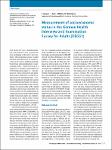Measurement of socioeconomic status in the German Health Interview and Examination Survey for Adults (DEGS1)
Lampert, Thomas
Kroll, Lars Eric
Müters, Stephan
Stolzenberg, Heribert
Socioeconomic status (SES) constitutes a central analysis category of epidemiological research and health reporting. As part of the German Cardiovascular Disease Prevention Study 1984–1991, a multi-dimensional aggregated index was developed for the purpose of measuring SES. This index continues to be used in numerous studies to this day. For the purpose of health monitoring at the Robert Koch Institute (RKI), the index was fundamentally revised following critical assessment. This article describes the basic concepts underlying the revision and how they were implemented in relation to the German Health Interview and Examination Survey for Adults (DEGS1). In addition, the results of the age and sex-specific distribution of the values of the revised SES index and those relating to the connection with other measurements of socioeconomic status are reported. The results are based on the data of DEGS1 2012 and the German national health interview and examination survey 1998 (GNHIES98).
No license information

